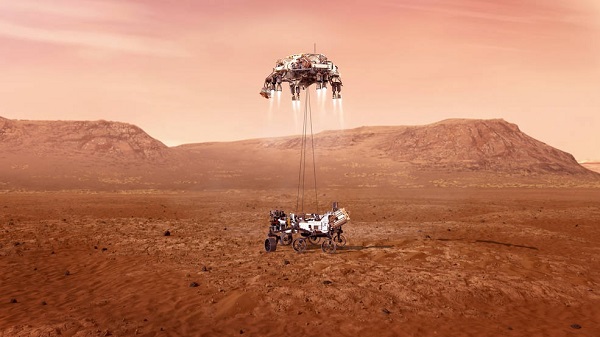
Washington, (Samajweekly) The American space agency, National Aeronautics and Space Administration (NASA), has successfully landed its Perseverance rover in a deep crater near the planet Mars’ equator called Jezero.
Engineers at NASA’s mission control in California erupted with joy when confirmation of touchdown came through, the BBC reported on Thursday.
“The good news is the spacecraft, I think, is in great shape,” said Matt Wallace, the mission’s deputy project manager.
“Congratulations to NASA and everyone whose hard work made Perseverance’s historic landing possible. Today proved once again that with the power of science and American ingenuity, nothing is beyond the realm of possibility,” US President Joe Biden tweeted.
The six-wheeled vehicle will now spend at least the next two years drilling into the local rocks, looking for evidence of past life.
Jezero is thought to have held a giant lake billions of years ago. And where there’s been water, there’s the possibility there might also have been life.
The signal alerting controllers that Perseverance was down and safe arrived at 20:55 GMT. In the past they might have hugged and high-fived but strict coronavirus protocols meant they had all been separated by Perspex screens. A respectful fist bump was about all they could manage.
Nonetheless, the excitement was evident. And the applause continued when the first two images came in. They were taken by low-resolution engineering cameras. There was dust covering the still-attached translucent lens covers, but it was possible to see a flat surface both in front and behind the rover.
Post-landing analysis indicated the vehicle had come down about 2 km to the southeast of the delta feature in Jezero that Perseverance plans to investigate.
“We are in a nice flat spot. The vehicle is only tilted by about 1.2 degrees,” said Allen Chen, who led the landing team. “So we did successfully find that parking lot and have a safe rover on the ground. And I couldn’t be more proud of my team for doing that.”
Steve Jurczyk, the acting administrator at NASA, also saluted the achievement: “What a credit to the team. Just what an amazing team to work through all the adversity and all the challenges that go with landing a rover on Mars, plus the challenges of Covid. Just an amazing accomplishment.”
Mike Watkins, the director of Nasa’s Jet Propulsion Laboratory, the home of the agency’s Mars missions, added: “There is something special about the first few days (of the mission) because we have just landed a representative of Planet Earth on a place on Mars that no-one has ever been to.”
This is the second one-tonne rover put on Mars by the US space agency.
The first, Curiosity, was landed in a different crater in 2012. It trialled innovative descent technologies, including a rocket-powered cradle, that Perseverance has also now put to good effect.









